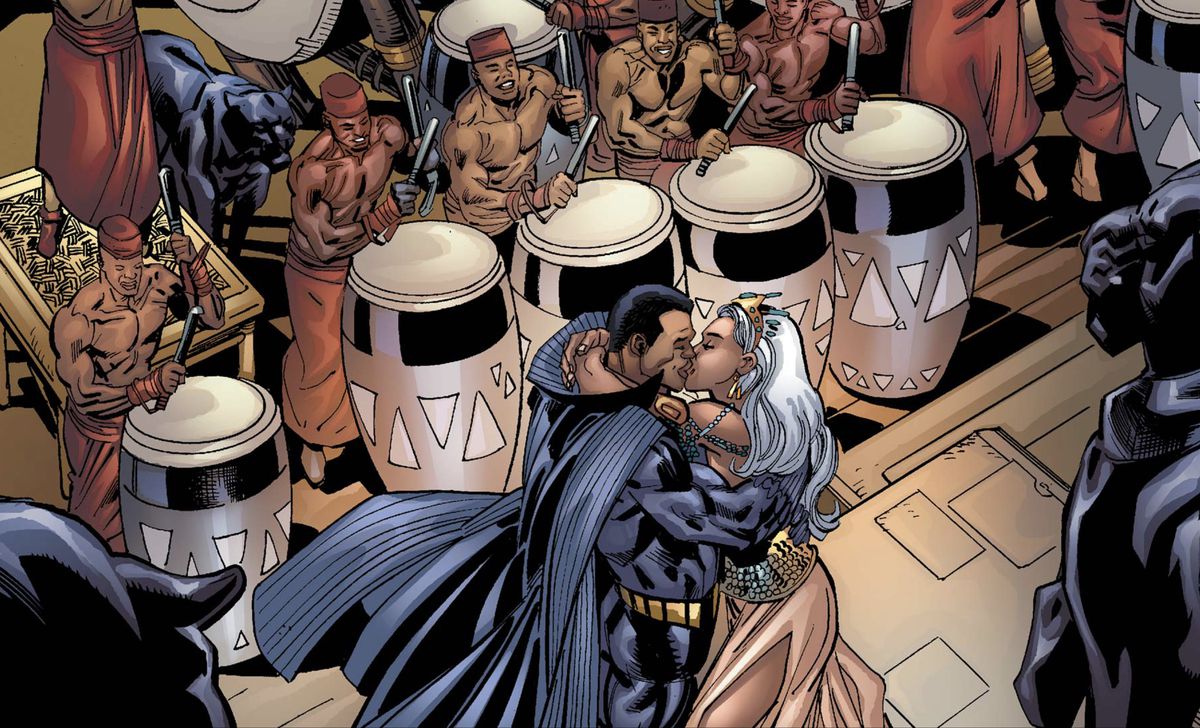Like nearly every Marvel Cinematic Universe movie before it, Black Panther: Wakanda Forever has a treat for fans who are patient enough to stay past the point where the credits start.
You’d be hard-pressed to find another Marvel post-credits scene that’s as touching as this one. But it also raises bigger questions about where the MCU is headed, and how closely it will follow the comics.
[Ed. note: This piece contains spoilers for Black Panther: Wakanda Forever.]
Image: Marvel Studios
The movie itself closes with T’Challa’s sister Shuri (Letitia Wright) finally able to confront her grief for her family by carrying out a traditional Wakandan funeral ritual. The credits scene picks up moments later, as Nakia (Lupita Nyong’o) joins the young Black Panther and introduces her to Nakia’s secret son — T’Challa’s offspring and Shuri’s nephew. The boy says he is called Toussaint, for Toussaint Louverture, a pivotal figure in the overthrow of French control in Haiti and the country’s transformation into a sovereign state of formerly enslaved peoples. But that, he says, is his Haitian name, and he has another: Prince T’Challa, of Wakanda.
Nakia explains that she and the late T’Challa conceived in secret, and decided to raise their son outside the pressures — and dangers, as Wakanda Forever so emphatically demonstrates — of the Wakandan court. It’s a beautiful button on the film’s themes, as Shuri embraces the final member of her family she didn’t even know she had. And it’s a tear-worthy tribute to the previous T’Challa, late actor Chadwick Boseman: a firm statement that a hero’s legacy lives beyond death in the actions of those who loved them.
What might make it even more special is that there’s no comic book precedent for the scene. The moment stands on its own, without the strings of existing Marvel Comics continuity that the MCU has so expertly weaponized to draw attention, interest, and ticket sales.
Wait, does T’Challa not have a son in the comics?

Image: Reginald Hudlin, Scot Eaton/Marvel Comics
Though T’Challa has had some deep romantic relationships — he and Storm of the X-Men tied the knot in 2005, only for T’Challa to annul their marriage seven years later, after Wakanda was destroyed by Namor, who was allied with the X-Men at the time. But he’s never been blessed with royal heirs, at least not in the main timeline of Marvel Comics.
But there is a story of a Wakandan prince that never was.
The modern Giant-Size X-Men was a loosely organized group of extra-long one-shot comics, each focusing on a different classic X-Men character in the dawn of the Krakoan Era. The books included a story in which a hyper-advanced and isolated human-supremacist society called the World infected Storm with a sci-fi disease, and Jean Grey and Emma Frost combined their telepathic powers to cure her. That was the story as printed — but the original pitch would have left a huge mark on the Marvel Comics universe.
As X-Men architect Jonathan Hickman (the writer who put Black Panther at the center of one of the greatest Marvel stories ever told) shared on the Jay & Miles X-Plain the X-Men podcast, the issue was originally going to reveal that Storm, having rekindled her relationship with T’Challa, was pregnant with their child.
“The next couple of issues would have been her having to go into [the World’s time-accelerated vault-civilization] and having the kid,” Hickman said, “who would have been raised in the World. So it would be this heir to two kingdoms who didn’t know the mother or the father.” The character would have taken inspiration from, of all places, the 2008 direct-to-video animated film Next Avengers: Heroes of Tomorrow, which featured the future son of T’Challa and Storm, Azari.
At the same time, however, writer Ta-Nehisi Coates was commencing the wide-ranging finale arc of his Black Panther, “The Intergalactic Empire of Wakanda” — which was full of its own elements of cultural amnesia and relativistic time shenanigans. According to Hickman, who bore no ill will on the matter, the son of Black Panther and Storm was one of the only big swings he asked for during his time as X-Men architect that Marvel editorial said no to.
As cool as a scion of mutantdom and Wakanda would have been, it’s probably for the best that Marvel nixed the idea. It’s generally a little odd, in the superhero comics world, for a huge development in one character’s setting to happen in a book that squarely belongs to another character or characters’ silo. And it left plenty of room for the Marvel Cinematic Universe to have its own take on T’Challa’s legacy in isolation, without the hovering context of any comic book precedent to adhere to or break away from.

